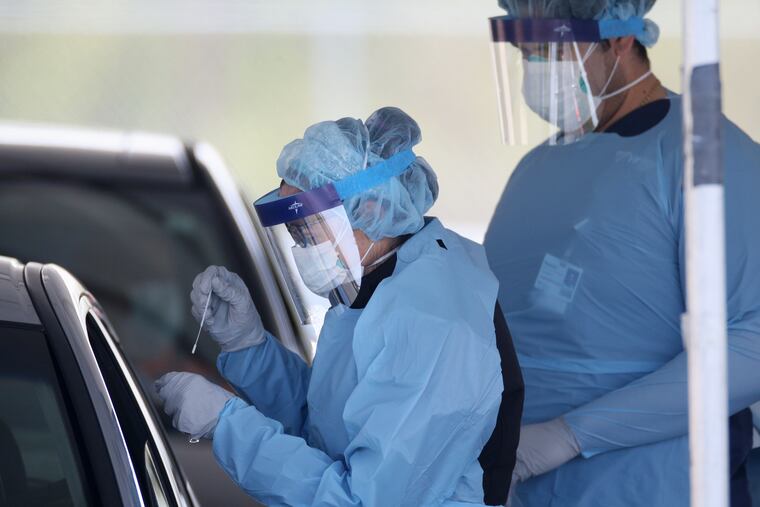South Jersey coronavirus cases are spiking — and testing might be why
State officials cannot explain the uptick in cases in South Jersey, but according to some local authorities, the increase in spread may be less about a migrating virus and more about expanded testing.

After wreaking havoc for weeks in the northern half of the state, the coronavirus pandemic has moved to South Jersey, Gov. Phil Murphy said Wednesday.
“There’s no question this is migrating south,” Murphy said. “In the south it is still a curve that’s going up and not down. We need to get the back of that curve cracked and headed in the right direction.”
In the last two weeks of April, the number of confirmed coronavirus cases doubled in Burlington, Gloucester, Atlantic, and Camden Counties, to more than 8,000, with more than 300 deaths, new data show. Cumberland County alone saw a 227% increase in cases, jumping from 210 to 687.
Overall, the curve of infections is slowing in the Garden State, which has implemented strict social distancing measures since March 21 and started to plan for how life will resume once it has receded from its peak. But the uptick in cases in South Jersey was something state officials were unable to explain on Wednesday.
According to some local authorities, the spike may be less about a migrating virus and more about an increase in testing.
"We’re going to expand testing as much as possible where the demand is, and that means more positives,” said Camden County spokesperson Dan Keashen.
Experts note that without robust testing, the true scale of the virus’ spread is hard to capture. Since the early days of the pandemic, Murphy and Health Commissioner Judith Persichilli have said that as testing ramps up, the state’s positive case count may grow more quickly than anticipated.
Through Wednesday, 116,264 people had tested positive statewide and 6,770 died. In the last two weeks, South Jersey counties have seen the number of positive COVID-19 cases increase at a quicker rate than any other region in the state.
But South Jersey has also seen testing efforts intensify. State officials partnered with Cooper University Hospital to test 3,000 residents and staff at 16 long-term care facilities in South Jersey.
Camden County officials opened a testing site in South Camden on Wednesday, the second testing site in the city and third county-run site. Next week, officials plan to launch another testing site on Federal Street in East Camden, a neighborhood that had been identified as a coronavirus hot spot.
But as New Jersey trails only New York among states with the most cases and deaths, gathering accurate and timely data has been a challenge for officials. An increase in testing has been crucial to efforts to battle the spread.
New Jersey now has over 80 testing sites across the state, and as Murphy plans on how to reopen parts of the economy, he is looking to double testing capacity before enacting measures to return the state to a more normal life..
“Testing is one of the most important weapons we have in our fight to stop the spread of COVID-19," said Kevin O’Dowd, co-president/CEO of Cooper University Health Care, which will manage the testing site in East Camden. “In order for testing to be effective, it must be widely accessible.”